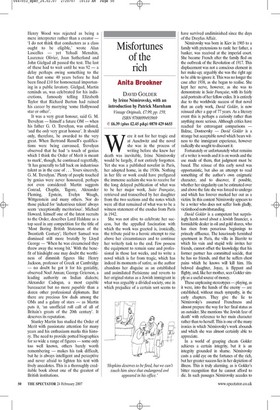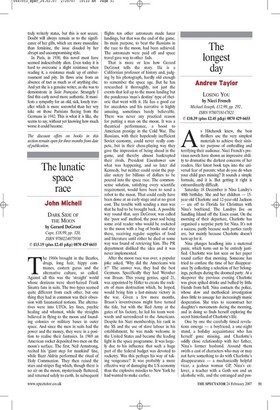Misfortunes of the rich
Anita Brookner DAVID GOLDER by Irene Nemirovsky, with an introduction by Patrick Marnham Vintage Originals, £7.99, pp. 159, ISBN 9780099493969 © £6.39 (plus £2.45 p&p) 0870 429 6655 Ivere it not for her tragic end at Auschwitz and the novel she was in the process of writing before she knew her death was inevitable, Irene Nemirovsky would be largely, if not entirely forgotten. Yet she was a published novelist in Paris, her adopted home, in the 1930s. Nothing in her life or work could have prefigured the immense acclaim she was to receive for the long delayed publication of what was to be her major work, Suite Francaise, retrieved and transcribed by her daughter from the two sections and the notes which were all that remained of what was to be a witness statement of the exodus from Paris in 1942.
She was not alive to celebrate her success, but the appalled fascination with which the work was greeted is, ironically, the tribute paid to a heroic attempt to rise above her circumstances and to continue her writerly task to the end. Few possess the equipment to remain sane and professional in those last weeks, and to write a novel which is far from tragic, which has indeed its moments of satire, as the author abandons her disguise as an established and assimilated Parisienne and reverts to her original status as a Jewish immigrant in what was arguably a divided society, one in which prejudice of a certain sort seems to have survived undiminished since the days of the Dreyfus Affair.
Nemirovsky was born in Kiev in 1903 to a family with pretensions to rank: her father, a banker, was received at the imperial court. She became French after the family fled on the outbreak of the Revolution of 1917. This displacement was not a conscious element in her make-up; arguably she was the right age to be able to ignore it. This was no longer the case after 1938, as she began to realise. She kept her nerve, however, as she was to demonstrate in Suite Francaise, with its fairly acid portraits of her fellow exiles. It is entirely due to the worldwide success of that novel that an early work, David Golder, is now reissued after a gap of 77 years. As a literary event this is perhaps a curiosity rather than anything more serious. Although critics have reached for extravagant comparisons — Balzac, Dostoevsky — David Golder is a strange but acceptable novel which bears witness to the immigrant experience, however radically she sought to discount it.
Fortunately or unfortunately what remains of a writer is words and it is on words and the use made of them, that judgment must be based. The reissue of this early novel was opportunistic, but also an attempt to read something of the author's own enigmatic character, and to discover, if possible, whether her singularity can be estimated over and above the fate she was forced to undergo and which has forever marked her out as a victim. In this context Nemirovsky appears to be a writer who does not suffer fools gladly, victimhood notwithstanding.
David Golder is a competent but surprisingly harsh novel about a Jewish financier, a formidable dealer in oil and gold shares, who has risen from penurious beginnings to princely affluence. The luxuriously furnished apartment in Paris, the villa in Biarritz to which his vain and stupid wife invites her friends, cannot offset the knowledge that his former partner has committed suicide, that he has no friends, and that he suffers chest pains which he knows will kill him His beloved daughter, Joyce, is flippant and flighty, and, like her mother, sees Golder simply as a useful source of money.
These unpleasing stereotypes — playing, as it were, into the hands of the enemy — are established, without much sympathy, in the early chapters. They give the lie to Nemirovsky's assumed Frenchness and almost prepare the way for her final status as an outsider. She mentions `the Jewish fear of death' with reference to her main character rather than to herself. This is one of the many ironies in which Nemirovsky's work abounds and which she was almost certainly able to appreciate.
In a world of grasping cheats Golder achieves a certain integrity, but it is an integrity grounded in shame. Nemirovsky casts a cold eye on the fortunes of the rich, but her greater success lies in her depiction of illness. This is truly alarming, as is Golder's bitter recognition that he cannot afford to die. In such passages Nemirovsky accedes to truly writerly status, but this is not secure. Doubt will always remain as to the significance of her gifts, which are more masculine than feminine, the issue clouded by her abrupt and uncompromising style.
In Paris, in 1930, this novel must have seemed indescribably alien. Even today it is hard to overcome a slight resistance when reading it, a resistance made up of embarrassment and pity. Its flaws arise from an absence of tact as much as of anything else. And yet she is a genuine writer, as she was to demonstrate in Suite Francaise. Strangely I find this early novel more authentic It manifests a sympathy for an old, sick, lonely traveller which is more sorrowful than her wry take on those Parisians fleeing from the Germans in 1942. This is what it is like, she seems to say, without yet knowing how much worse it could become.
The discount offers on books in this section remain open for three months from date of publication.























































 Previous page
Previous page